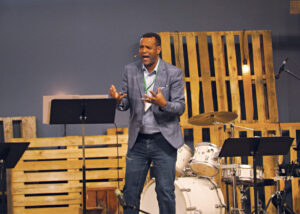Journalism is a tense and often misunderstood business, especially within the church. Readers get riled, interviewees feel gypped, church leaders squirm. But in many ways the tension is the essence.
I distinguish between “newsletterism”: straight up churchy news with no probing of deeper layers (“Relief sale has record year”); devotional articles (“How relief volunteering deepened my walk with God”); opinion articles (“Why I think relief sales need to be reinvented”); and journalism (“Experts debate pros and cons of relief sales”). The latter is the diciest.
Good journalism should identify important issues, provide context, ask good questions of appropriate people—especially decision-makers—and present the essential perspectives of those people as clearly as possible. Each step is fraught with discretion. It is as much art as science.
Of course, it has its limitations: print space, readers’ attention spans, the inadequacies of language, the inadequacies of journalists.
While no one is truly objective or unbiased, a good journalist will calmly open vital conversations while leaving readers—or listeners or viewers—to arrive at their own conclusions. That is why I like Jim Brown better than Anna Maria Tremonti or Carol Off on CBC Radio. The leftward bias of the latter two is predictable and often evident. But I usually can’t tell where Brown stands on an issue. That’s good. He trusts the listener. He challenges me to think for myself.
Journalism is not about pinning down truth. It is not the last word, but part of a sometimes testy back and forth that includes letters to the editor, opinion articles, church foyer discussions and subsequent articles. At its rare best, journalism believes truth involves some push and pull. It believes in nuance. It believes people should think for themselves. It takes seriously a range of perspectives. It believes in asking questions and listening.
There is a part of all of us that wants articles to just bolster whatever we believe already—or bolster the nasty things we believe about the “other side”—but that is where journalistic inquiry can nudge us towards greater maturity.
I have interviewed many people I disagree with. A key turning point for me was when I stopped doing such interviews with the intent of cherry picking quotes that would make them look bad and started simply trying to understand them. That was freeing both as a journalist and a person.
Polarization is a great threat in our world. Lines of division are drawn ever clearer. People are ever-more addicted to having enemies. Self-righteousness flourishes. And today’s media environment allows people to drift ever further into info-enclaves of the incestuously like-minded. Good journalism leads readers beyond their chosen niches, across boundaries.
Another key role of journalists is to question authority figures. This is one of the imperfect pillars of democracy, providing a means of public accountability.
None of this makes journalism an obvious fit for the church. Some people see church as precisely about narrowing down the truth, which leaves little room for varying perspectives. As for questioning leaders, this can also cause tension in the church, especially when the national church body is a key funder of a publication, as is the case with Canadian Mennonite. Can you publicly scrutinize your funder? Does a funder have the right to direct content? It’s a constant tension.
Frankly, some public church figures understand the important, if sometimes uncomfortable, role of journalism. Others bristle, although that is rare.
I believe leaders should be treated with respect. I also believe we are all adults capable of adult conversation. Accountability has always been an element of faith. Of course, journalism itself has a built-in, although imperfect, accountability mechanism in the form of letters to the editor and opinion responses. I take all criticism seriously. There is always something instructive.
On occasion, people I interview will ask to see the article before it is published. Sometimes journalists will allow sources to verify their quotes, but not see the whole article. These are fundamental journalistic no-no’s, for two reasons:
- There is an unwritten understanding between readers and journalists that when, for instance, the Globe and Mail prints an article about Justin Trudeau, Trudeau hasn’t first massaged the wording behind the scenes. The same applies in church: journalists need independence.
- Plus, if I interview four or five people for an article, it is simply unworkable for me to have them all review drafts.
I believe there is room for a blend of newsletterism, devotional writing, opinion and journalism in Canadian Mennonite. And, of course, sometimes styles merge. I often present information in a journalistic fashion, but add my own opinion, devotional angle or analytical question at the end, sometimes because I feel the people I have interviewed missed vital angles.
In the end, it’s all part of the winding path to growth.







Leave a Reply
You must be logged in to post a comment.